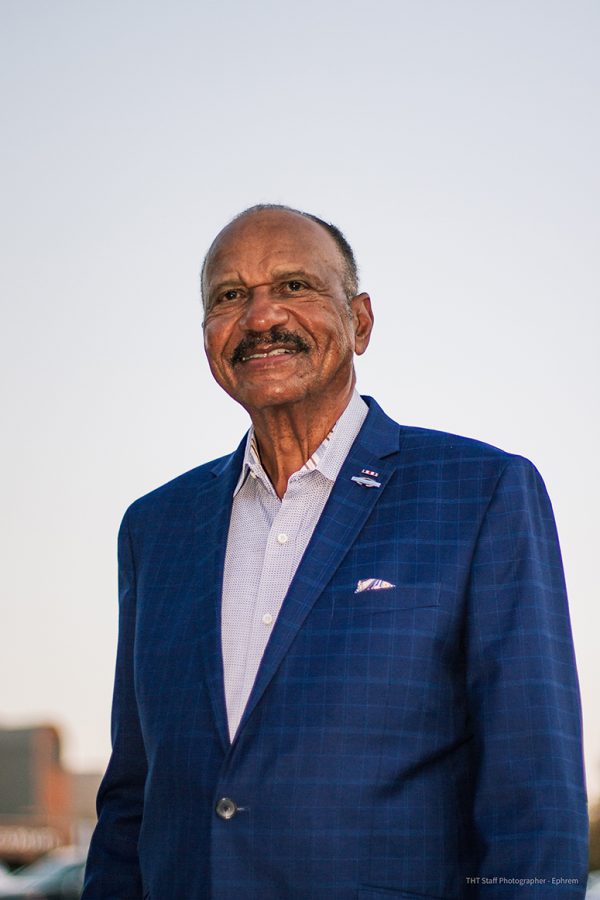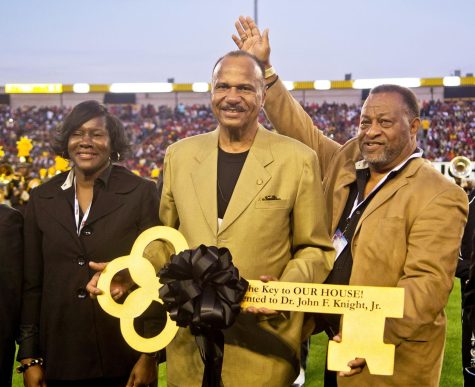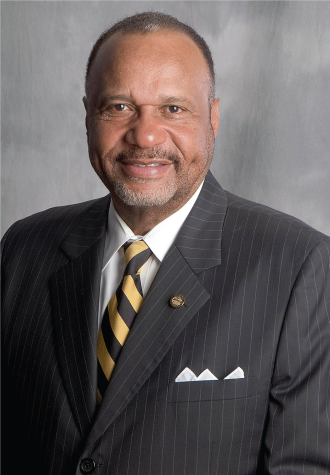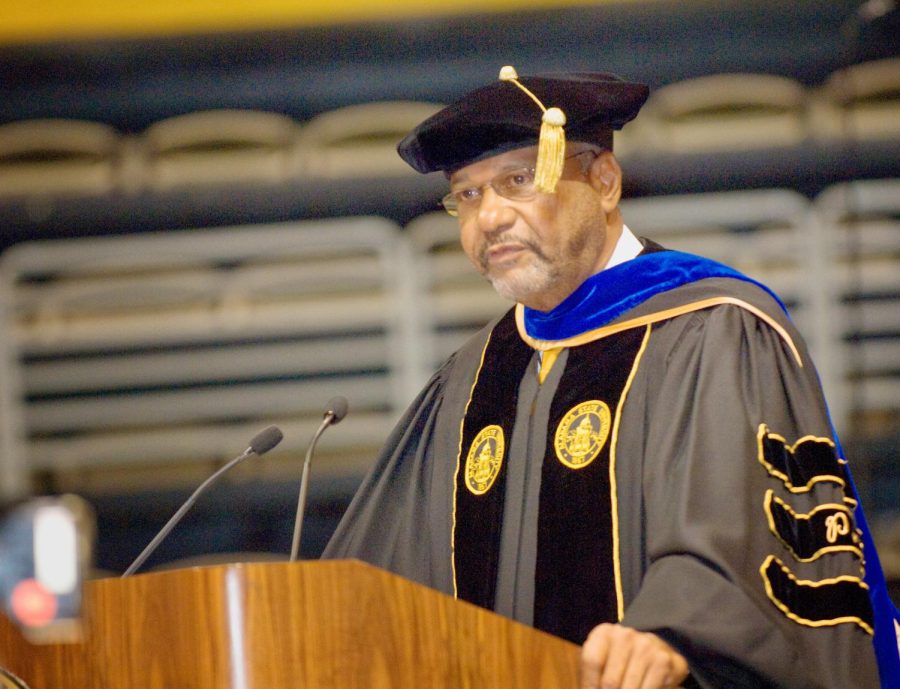Knight finds his life’s purpose in representing others
Former Executive Vice President and COO of Alabama State University John F. Knight, Jr., introduces the guest speaker during a Founders’ Day observance that was held in the Dunn-Oliver Acadome.
November 27, 2021
Due to the lasting effect of the American Civil Rights Movement and many more social reforms, society has learned that the best way to bring change is to do so peacefully and systematically.
As all state laws and public policy are the work of the state legislatures, African Americans have established a growing presence in the branch over the years. This growing presence in the Alabama Legislature was represented by Alabama State University alumnus John F. Knight Jr., LL.D., who served in the Alabama State House of Representatives to represent those often overlooked.
As an advocate for the underrepresented and a trailblazer for Black politicians within the state, he brought opportunities for social, educational, and political advancement for the many generations to come. Considering his life’s purpose to be to fight for others, he appreciates how far society has come while also being aware of how far society has to go.
“My thing is about helping people,” Knight said. “I think that was the reason that I was saved.”
As a native of Montgomery, Alabama, Knight grew up as one of four children to Ruth and John F. Knight Sr. Considering his family resided on the infamous Hall Street during the mid-20th century, he held front row seats for the most pivotal moments in African American history. While he was too young to appreciate it at the time, this spirit of activism carried him throughout his career.

“I was right in the middle of everything that was going on during the American Civil Rights Movement,” he said. “I was right up the street for about three blocks. I can recall a couple of nights where the Klan marched down Hall Street. I can recall when Dr. King’s house was bombed. I can recall when Rev. Ralph Abernathy’s house was bombed.”
Knight attended Booker T. Washington High School for his primary schooling. Though he played basketball for Booker T. Washington High School, his main interests lay outside the school system. As a way to support himself, he spent much of his time working. Serving as a newspaper deliveryman and as a worker at the local grocery store, he was able to make ends meet while also interacting with his community.
“During that time, even though you did not have much, you still felt blessed and took advantage of the things that you did have,” he said.
Knight graduated with his high school diploma in the spring of 1963 and was drafted into the United States Army in 1966 to fight in the long-running Vietnam War. As one of 300,000 Black soldiers who were called to service and of an even smaller group of infiltrators, he witnessed the gruesome horrors that come with war. Serving as a platoon sergeant, he was responsible for accommodating, supervising, and leading a specialized group of individuals.
Due to his exemplary bravery and discipline, he was able to work his platoon through many crucial and dangerous moments. In January 1969, Knight maneuvered himself and his team through an ambush attack by the North Vietnam Army. As he put his men first, he worked to track targets of opportunity, tended to the wounded, kept radio contact with others and much more for 12 hours. His action during this time led him to be granted the Silver Star Award, the third-highest military decoration for valor in combat.
As printed on his Silver Star documentation, “Sergeant Knight’s personal bravery, aggressiveness, and devotion to duty are in keeping with the highest traditions of the military service and reflect great credit upon himself, his unit, the 25 Infantry Division, and the United States Army.”
“If there were three characteristics that were more outstanding than others, it would be your initiative, conscientiousness, and reliability,” said First Lieutenant James T. Thompson, a platoon leader. “Continually striving to improve yourself, your job, and your men, regardless of the mission, large or small, you always completed it with impeccable competence.”
In 1969, Knight was discharged and returned to Montgomery as a civilian. As he dealt with the traumas of the war and survivor’s guilt, he considers this period to be the most challenging of his adult life. While also working at the local post office, he decided that it was time to continue his formal education. With a child to support, and the need to remain local, he enrolled at Alabama State University as a business administration major.
Though he was a nontraditional student, he found that Hornet Nation still welcomed him with open arms and saw him through his collegiate experience. He remembers instructors such as Thelma Glass and John Garrick Hardy, Ph.D., who accommodated the needs of the veteran students while also holding them to a higher standard.
“It was because of the faculty members who really cared about the students that influenced us at that time,” Knight said. “A lot of us were just coming from the war and did not know what direction we were going.”
Because he continued to work as a college student, Knight could not participate in many school-organized extracurriculars. Along with his involvement with the veterans club, he also worked with the Student Government Association, where he served as the president of the 1973–74 academic year. As he observed the inconsistencies within the school operations and the grievances of the students, he felt that he was the best student to bring change to the campus.
“I will not say that we were underrepresented, but I will say that I was the best representative for them,” he said regarding his race for SGA president. “I felt that I could represent the students because I carried myself with a certain amount of independence. I was employed, I was getting a check from the federal government once a month, so I did not have to worry about getting my scholarship revoked or punished. I would not take the same stuff that a regular student might have.”
With his position as SGA president, Knight found it most important to advocate for the needs and wants of the student body. As many held concerns regarding academic labs, food services, the residence halls and more, he made sure that each person was heard and accounted for. In order to do this, he revived the spirit of the ASU students from only a decade prior as he called students to speak out and take action. Considering he had already experienced the harshness of the real world, he worked to ensure that the Hornet’s Nest not only remained a haven for the Black community but also prepared students for life after their degree.
Though he was purely motivated by the needs of the students, his success in this position granted him respect from many members of Hornet Nation and notable figures of the Black community, such as Rev. Al Sharpton, Rev. Joseph Lowery, Joe Reed, Jesse Jackson, and more.
“When they had an issue, they would need numbers to show that they had support,” Knight said. “Students were the base. The university was the base. They would call and say they needed students, and if we believed in it, we would show up. It was amazing, really. I enjoyed that interaction with them because we looked up to them. They were very powerful in the Black community.”
Through all of his work as SGA president, he considers his time preparing for a comedy special featuring Dick Gregory as the most memorable. Being a civil rights activist, Gregory was known for his raw and unfiltered commentary regarding racism and other social injustices. Considering he was seen as controversial, university administrators discouraged his visit and revoked the allotted funds. With his mission to serve the students, Knight turned to outside sponsors to support the function.
“I got together with community leaders, like Rev. Al Dixon, who raised money for it,” he said. “You see, he was very controversial, so there were some people who were not happy about that, but as SGA president, we got him here!”
Knight graduated from ASU in 1974 with a bachelor’s degree in business administration with a concentration in political science.
He soon found work at the Alabama Public Service Commission (ASPC), the governing body for various utilities throughout the state. Due to his experience working within a government structure, and connections made through the Alabama Democratic Conference, he was appointed as the executive assistant to the president. As the first African American to hold an administrative role within the APSC, this would be the first stop in his journey as a trailblazer.
In 1977, Knight returned to his alma mater as the public relations director. He was personally offered the job by former university President Levi Watkins, LHD, with whom he shared a rocky relationship. During the SGA presidential race of 1973, Watkins supported the campaign of Knight’s opponent, giving a sour start to their association. Fortunately, as the years progressed, the two established a mutual respect for one another.

“At the time that I worked under him I did not quite understand him, but after reaching a higher-level position, I understood why he was the way he was,” Knight said. “He was a meticulous president, he was very concerned about the university, and he did a lot to move it forward.”
Though their relationship took a rough start, Knight believes that accepting the position to be the best move of his career as he learned many things under Watkins’ leadership. From university operations to management and more, Knight quickly became adept to the “behind-the-scenes” happenings of higher education.
Excited to rejoin the university community, he planned to build a solid public relations department to engage the community and prospective students. With community outreach being his long-term goal, he most immediately addressed issues held by the students.
“I always appreciated the environment that I had when I was here, so I wanted to make certain that we continued that environment,” he said. “All while I was here, I was pro-student. I wanted to have a strong and positive environment so that they would love this university so that they would feel a special kinship so that no one could say anything negative, even if they thought it.”
In 1980, Knight began his tenure as a Montgomery County Commissioner. Considering he actively participated in many local political organizations and was known for his SGA presidency, he established a strong following throughout the county. Valuing community involvement and advancement, he quickly gained a reputation as the voice for the underrepresented.
It was in this position that Knight noticed the disparities of university state funding compared to that of the other public institutions of Alabama. As the state continued the integration of public universities, they planned to bring satellite campuses of major four-year institutions, such as Auburn University and Troy University, to Montgomery, Alabama, to cater to the local Caucasian population. Many officials of Hornet Nation were outraged as it would lead to a decrease in the university’s enrollment, state-mandated budget, resources, and more.
“What would be the reason, other than race,” Knight asked. “Because ASU could provide everything that any of those students needed. They would not do that to Auburn. You would not see them bring another four-year institution right next to their campus.”
This conflict prompted the infamous Knight v. State of Alabama court case. Filed in 1981, this case addressed the many inequalities faced by the public HBCUs of the state compared to the public predominantly white institutions. As the lead plaintiff in the case, Knight supported his claim with historical state documents that proved the existence of systemic racism within the public education system.
“They could not deny it because all of the records, the constitution, all of the bills said that they were going to discriminate against Blacks,” he said. “They could not deny it, so they had to take it.”
In 1995, after the second trial, the United States District Court for Northern Alabama ruled in favor of Knight, claiming that many of Alabama’s policies upheld segregation and inequality in the state’s places of higher education. A plan was created to combat the disparities created by years of de jure segregation. One of the most notable changes made was that a trust fund was created for the HBCUs of Alabama, where the state would match any charitable donations made by the university’s alumni and supporters. This influx of funding is one of the many goals that Knight achieved with the case.
“At the time that we started the lawsuit, we had a reserve of $2 million,” he said. “Now, we have an endowment of one hundred million dollars. That is quite a lot for a university, especially an HBCU. So I am very proud of that.”
Because of the settlement and additional funds, many new facilities and opportunities for advancement were brought to the Hornet’s Nest. One of those being an 80,000-watt broadcasting station added to WVAS-FM 90.7 radio station that provides work experience for many of the university’s students.
“I always felt that we put students first,” Knight said. “You have to provide things that you know they will need out there in the real world. It is one thing to get acclimated to the lectures and all of that, but you always have to know what happens when you leave the classroom, and you have got to be prepared for it.”
Considering the case allowed 10 years to execute policies, it was reviewed in 2005 and officially closed in 2007. As Knight was motivated by the betterment of ASU students, he did not understand his personal impact on the university until the cases’ conclusion, nearly three decades later. He appreciates the work of the team of lawyers, plaintiffs, archivists, and all who assisted in the cases’ success. While he is proud of the work done, he urges that the students of the university make the most of the resources that he fought so hard for.
“I do not like to sit and talk about what we did in the past. It is about what we are going to do in the future,” Knight said. “I am glad that [the case] grew, and I am glad that we were successful. History is history, but take advantage of the opportunities that are here now and make the best of them. And continue to grow.”
In 1993, Knight concluded his work with the Montgomery County Commission to serve in the Alabama State House of Representatives as the representative for the 77th district. As a state representative, he held the same attitude that carried him throughout his previous political positions.
“My philosophy in the legislature was the same as it was at Alabama State,” he said. “We were there to serve the people … People that need representation are people that cannot afford to hire lobbyists, people that cannot afford to go fight for themselves. So that is what your representative is for, to fight for you.”
With his primary goal to provide equity to the overlooked and underrepresented, Knight targeted funds, taxes, and employment issues. He worked on initiatives that brought Hyundai Motor Company to Montgomery, which also brought jobs for locals, worked toward increasing the income requirement for families to pay income tax, brought additional funds to the HBCUs of the state, and much more. His advocacy was so well respected that his fellow legislators would outright ask how much he would need to support universities whenever a new budget was introduced.
“Whenever there was a budget being introduced, everyone would ask, ‘Knight, how much do you want for the university?” Knight said, “We were not just asking for peanuts, we wanted it all. You are not going to shortcome us. If we get a facility, it should be the best facility. If we were getting new programs, we wanted the best programs.”
“We have, what I call, an involuntary tax function,” Knight said. “It is where the rich get richer, and the poor get poorer. This argument is still going on at the national level. There are multimillion-dollar corporations that pay zero dollars in taxes, but the poor people, with work and families to support, are forced to pay their fair share. So, at some point, people will call what I want to be socialism, but it is not. It is just being fair. Where you want the burden to be equitable.”
Though the span of his reach grew as he became a state legislator, he always kept the needs of the Hornet Nation in mind. While some of his counterparts might have considered him crazy, he knew that the impact of his “craziness” would lead to the academic and professional success of many college students.
Within the state house of representatives, Knight also served as the chair of the General Fund Committee, making him the first Black to chair a major committee within the state Legislature. As he was responsible for appropriating for all of the state’s agencies, he continued his advocacy for those who struggled. With this being his second time being the “first Black” in an administrative position of authority, the accomplishment only emphasized the need for more minorities in high-ranking roles.
“There should never be a reason why you should not have the opportunity all along,” he said. “I am happy to have been able to break some barriers, but at the same time, I am frustrated that I even have to do so.”
While the inequality within society and professional settings is a frustration shared by many, it especially bothers Knight, as he is a decorated veteran. Considering he traveled overseas to risk his life fighting for the well-being of others, he finds it disappointing to have to do the same in his home territory. As it seems that he cannot escape the racial turmoil, he has turned the frustration to fuel. Still following the philosophy held as SGA president, he works to relieve his constituents from that same frustration. Believing that he was spared for a reason, Knight considers his life’s purpose to restore the disparities caused by racial discrimination.
“If you have seen what I have seen in war and you are over fighting for an unknown reason, in many cases, and you come back to your hometown and see the conditions, you see the environment, you see the hate, and you see the racism,” he said. “It is a thing that makes you just want to continue. So, that was the driving force in me to make it better so that when you all come up, you will not have to worry about it. It will be automatic.”
In 2018, Knight completed his tenure as a state legislator. After 25 years in the position and even more as a political figure, he has established an ever-growing appreciation for the leaders before him and those who work actively in the community. As they were, and are, driven by the same motives as Knight, he understands the sacrifices made in order for one to serve the public. His time as a legislator has also shown him how much work is still to be done within state and federal politics. Believing that people should be free to live, he denounces many policies in place that prevent this.
“There should be no limitations if you want to do something,” Knight said. “There should be no restrictions based on race, or color, or sex, or anything. If you are a human being you ought to be able. And I hope that, with the struggle and fights that I have been through, that for my children, my grandchildren, and great-grandchildren that it will not be as difficult.”

Through his decades-worth of service to the community, he considers the most rewarding aspect to be the opportunity to represent the people of the state. As he was able to bring restitution to the community, the community put confidence into him, establishing a relationship that allowed both parties to grow.
“It is such a rewarding thing as people put confidence into you, and to represent them and to fight for things that we have yet to receive,” he said.
Along with his passion for social equity, Knight credits much of his success to the ideals instilled by his parents. As they provided a no-nonsense yet supportive household, he held a certain level of self-discipline that allowed him never to back down or settle for mediocrity.
“Even though we did not have a lot, they always wanted the very best for us,” he said. “They demanded discipline, and I think that helped me a lot in life.”
He also appreciates the impact that the university left on his life. As he was able to collaborate and work with many notable faculty and administrators, he learned a countless number of life lessons along the way. Considering the university laid the foundation for his education and career, he continues to hold a great kinship to the university.
“If you are able to go through the things that you go through, work with the faculty and staff that are there, then you are prepared to get out there in the real world because the people love you,” Knight said. “They want to make certain that you are successful. They put in that extra effort, and I think that is the most important thing that can happen to a young person.”
In his personal life, Knight is the proud father of Tamara Knight Fleming and Tehrik Knight. As a pastime, he enjoys venturing out and playing golf. He serves the community through many associations and organizations, a few of them being as chair of the Kershaw YMCA, chair of the Montgomery Housing Authority, a member of the Montgomery Improvement Council, a member of Saint John AME Church, and much more.
As he remains student-oriented, he offers a piece of advice for students hoping for a career in politics. As the media progresses and politics continues to become a spectacle, he emphasizes that in order to be successful, one must genuinely work in the interests of others. The successes of his career serve as a testament to his words.
“You go into politics to help others, not to help yourself,” Knight said. “You have got to realize that when you go into politics if you are going to survive, and be successful, that the less that you do for yourself, the more success you will have in accomplishing something.”
For all of Hornet nation, he urges for unity on campus. As ASU’s rich history is known worldwide, he encourages students not only to honor it but also to show great pride in it. Due to the racial climate today is growing into fragility, Knight wishes for those of the university to become inspired by the legends of our past and to lead by example.
“Let us put all our forces together because right now we are going through some of the most difficult times in this country,” he said. “We need to maintain our leadership role in the community and also at the national level with helping people who may not have the same opportunities that we have.”
Also, to Hornet Nation, Knight says that he is still an advocate for all things at ASU. That being said, he offers the trademark question that he shared each time he would broadcast on the university’s WVAS-FM 90.7 station, “How do you do?”







